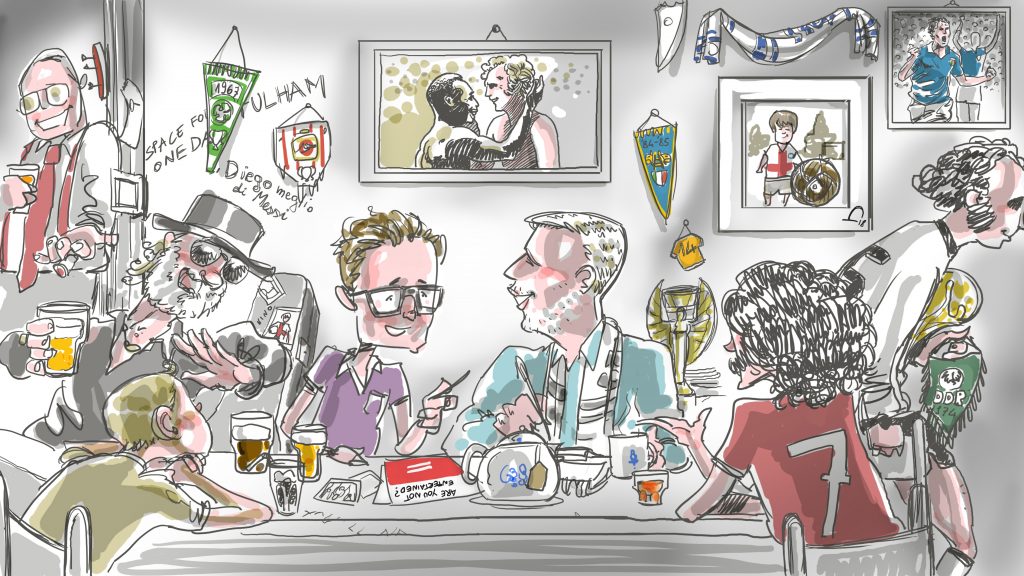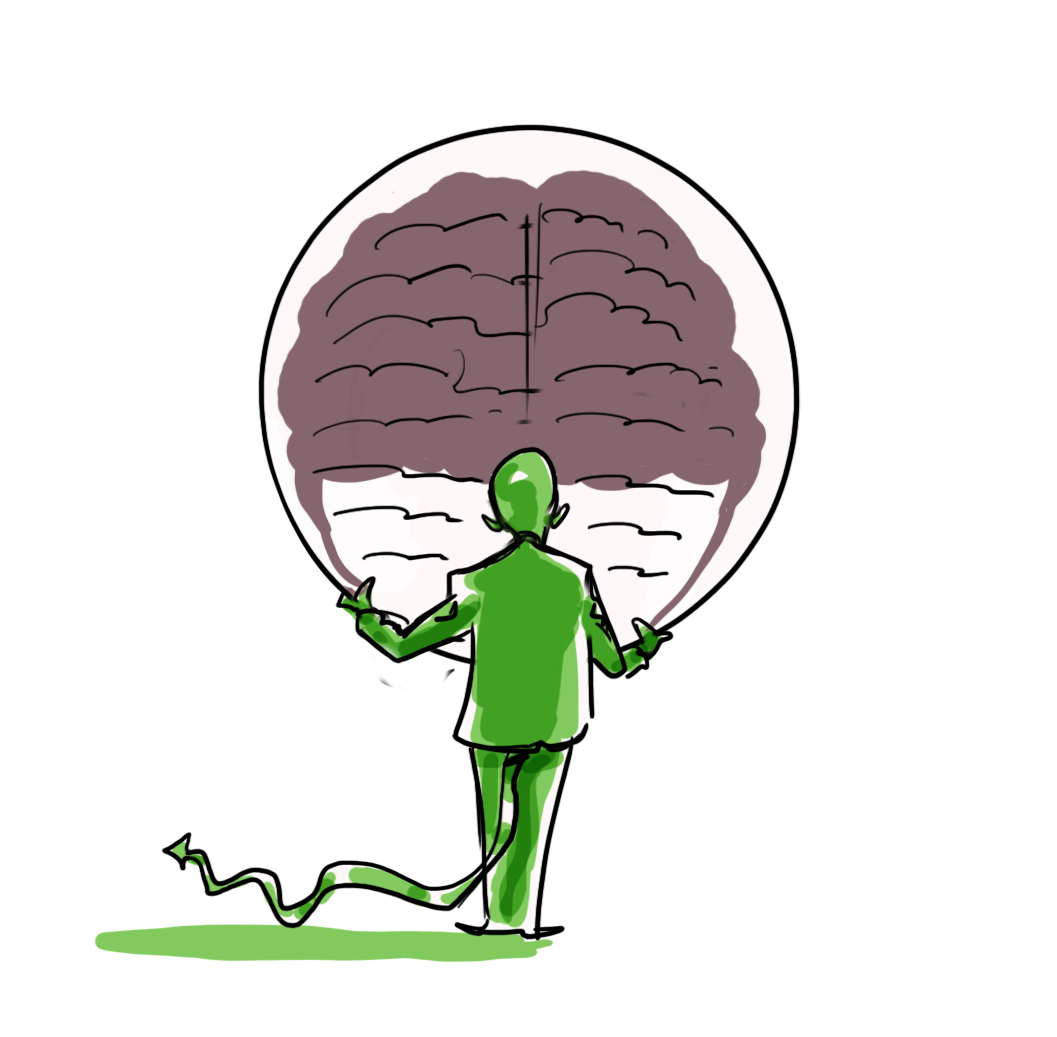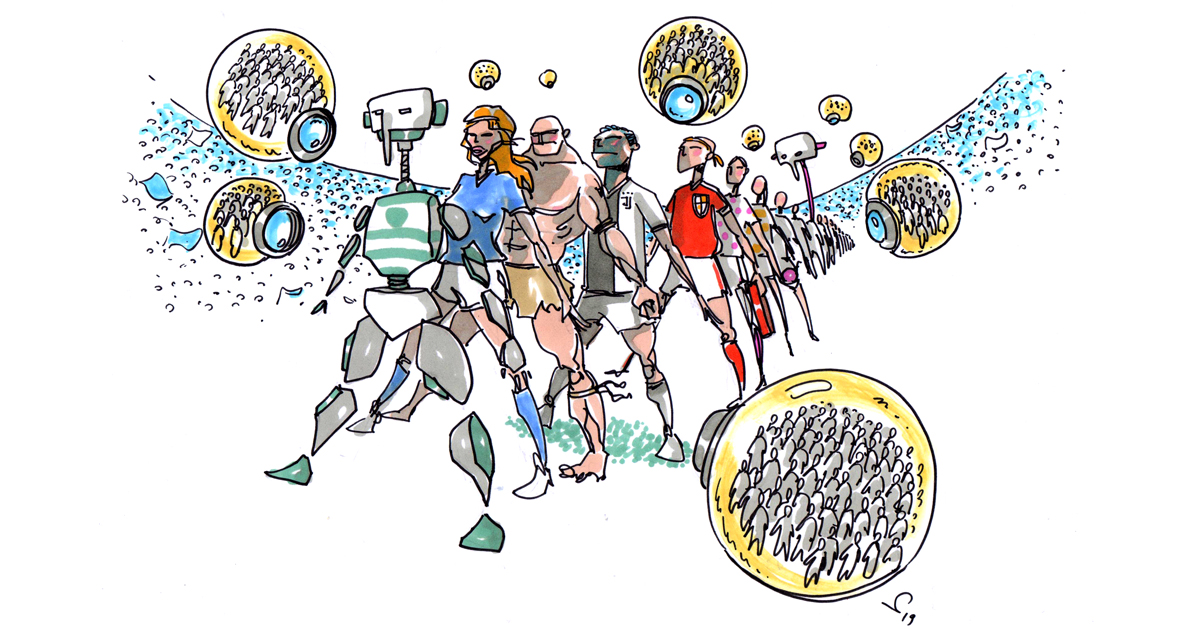On what is one to reflect upon during an 11 hour flight to NAB in Vegas?
The future, I’d say.
The last 30 years in music, sport has been utterly dictated by tech disruption. Whether it’s from the rights holder perspective, the broadcaster, sponsor, publisher, artist/athlete.
But it’s only started. Do people get that? Are they still preparing for yesterday’s war?
Perhaps it’s overly superficial, but what we are talking about here is market forces. Simple laws of supply and demand.
Can you buck the market,
when tech has now flattened all previous defences?
The music business, failed. They insisted on trying to sell a bundle of 10 tracks, based on only 2 mass market hits; sometimes even 1. Kids had stopped buying singles with the passing of vinyl and now were shelling out £15 for 8 tracks about which they were genuinely ambivalent.
God bless The LP!
God bless the bundled model of hits and filler.
The day Sean Parker introduced Napster, all this was over.
They never saw it coming, even the smart guys.
As a matter of fact, once digital distribution allowed easy storing and sharing of individual songs or events, a business model died. And, therefore, a new word entered the vocabulary.
Disintermediation.
It and its close cousins, “unbundling” and “polarisation” have now begun to attack the sports business. Will the end be the same? Will tech rip apart the sports bundle?
What I do for a living is help folks get to an answer to this. I actually just plagiarize the best minds in the industry, who generously share their views on my podcast.

AYNE – Are You Not Entertained? – Albachiara podcast
Sport was, and is, organised across geographical lines controlled by inflexible national regulators, called federations and leagues. Conversely, in most industries, you are free to independently expand into new geographical territories. In sport, you are not!
In August 1998 I personally joined the sports industry proper and, in my first jolly, attended the UEFA SuperCup final in Monaco.
(As an aside, my main memory of that remains Ken Bates: I ask him how his new signing Brian Laudrup is fitting in. Laudrup had been the best player in Scotland for seasons. “Not bad considering he’s been playing reserve football for 5 years.” And he turns away and leaves. What is it they say?: you’re in the NFL now son)
He, in reality, had no time for small talk, as the continent’s big clubs – that trip – were openly discussing a new international super league. A breakaway from those geographical chains. The head of the Italian league, Franco Carraro, was visibly exercised “why do Lazio get in, and not Fiorentina?”.
They were debating who fell which side of the unbundling drawbridge. They were deciding who was a hit, and who could be lost as merely filler.
The parallel with the music LP was obvious.

The whole thing had, in fact, an Italian flavour. Since Berlusconi’s genius for understanding the appeal of bread and circuses for football (and politics), the unbundling polarisation in European football had begun. Now, in 1998, the Italians from Media Partners had tabled a breakaway league for European football. But in reality, all these innovators were following an Australian media mogul called Packer, who, in cricket in the 70s and rugby in the 90s, had sold the same simple simple truth:
The market really only wants the hits, not the filler!
This is a fundamental and ultimately fatal attack to the core of how the sports industry is organised in Europe.
For me, 2 weeks into my job, it was an epiphany moment. Like in the industry that I’d just left, the market only wants the hits. Not interested in Wigan v Bolton or Chievo v Atalanta.
The only question was the journey to get there, and who owns it? Just like rugby in 1995, would the governing bodies be able to acquiesce quickly enough to take the sting out of a full rogue breakaway?
As we write this in Spring 2019, the answer has been, yes they have. The UEFA Champions League has moved, is moving, and will still move, to avoid that breakaway.
I traipsed back to Scotland and, in the next 4 years we tried every possible way to end on the right side of the drawbridge: The Atlantic League, merger with English leagues, merger of clubs.
No luck, and now in 2019, the brutal polarisation in European football is now almost complete. Juve have won 8 titles in a row. Bayern 6? PSG?
Point is we are losing count; and interest.
Where to now?
My own view is that you cannot buck the market. And the old geographical leagues will rip apart, leaving sport in reality with 2 products. Just like the music and movie businesses.
Hollywood and arthouse. Major and indie.
The opportunity lies here. Finding the post-Iphone nexus, with the right content, delivery and revenue models.
Hollywood sport will likely find a bid with the Disneys, Comcasts, Turners, Amazons, Apples.
The fun bit is the rest. Non premium sports and leagues.
And that’s why NAB is important for me.
We are there with 2 clients:
1.
An AI company called Pixellot, which provides affordable unmanned production solutions to those smaller sports and clubs. It unlocks their business model economics. It plays into the OTT theme.
2.
A visionary mediatech company called SmartSportz, creating new virtual arenas for the many smaller sports, where the cost of travel logistics and the stadium itself are not sustainable. The holodeck for sport, built on Epic’s Unreal Engine. It will become for sports the kind of game changer that Pixar was for Disney.
So, let’s finish the rambling as we approach to land.
What are my conclusions?
- Polarisation is here. Therefore, heterogeneous sports like old LPs, will not be able to hold together. Better for sport to get ahead of the curve and manage it. The skill will be in finding leaders for sport who can find that right balance. It’s delicate.
- Fans and their needs are polarising also:
Big eventers
Local traditional fans, likely older
Younger fans more in sync with Twitch
Fans who will never attend the event
Can audiences with very different desires still be satisfied by one sport, one stadium, one format?
- There will be a generational gap in preferences for content and screens to consume. As social media has forced television to change, it will also drive intense change in sport and its formats and delivery style.
- Some sports may come to resemble more of a TV format like Xfactor, consumed in attractive VR/AR worlds. Indeed, the gaming and sports worlds will converge. One catalyst will be Epic’s Unreal Engine.
- Other industries, like education, will go down the SmartSportz route.
Good luck to all of us. Be brave.
Off to the craps tables.



